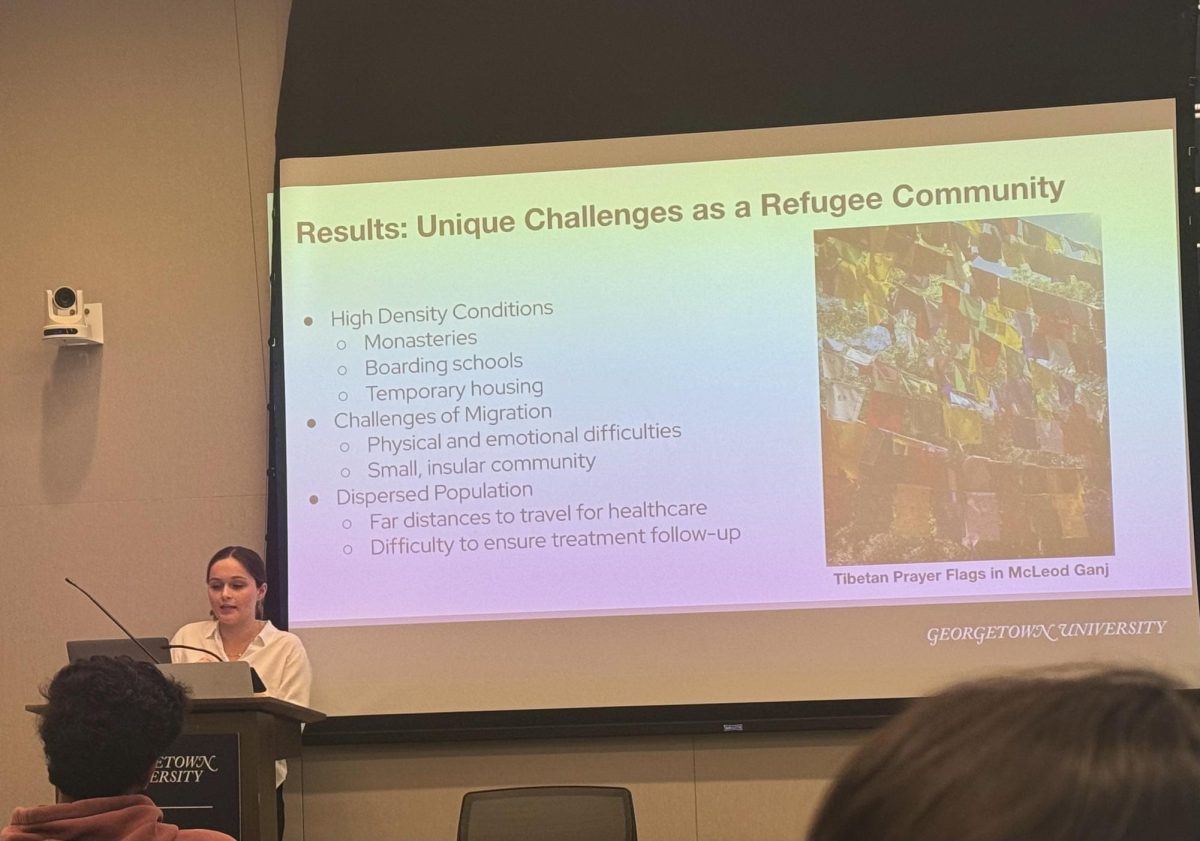Not just the tech-savvy take to the blogs at Georgetown.
Required blogging has made its way into a number of classes in recent years, as professors find greater value in establishing a discussion forum outside of the classroom.
There are approximately 50 course blogs in operation this semester, according to the Center for New Designs in Learning and Scholarship. That number has remained fairly stable for the past few years.
According to English professor Eddie Maloney, managing director and director of research and learning technologies at CNDLS, a course blog can provide the same intellectual opportunities for students that reading journals used to offer — the medium can give them time to mull over material.
“Depending on how you use it, it actually gets students to write about their experience with the material in class, and in that writing, they start to reflect and formulate thoughts that they may not have any other opportunity to do,” he said.
Much of Georgetown’s blogging is done through Digital Commons, a blogging program that allows professors to set up password-protected forums that can be accessed only by students in the class. At the professor’s discretion, the blog can be made public as well, though Maloney says that professors should inform their students if they plan to do so.
“If [the blogs] are private, and they are set up to be private, and the students know that, then the expectation is that they will remain private,” Maloney said. “But this is something to ask. If you are going to be asked to put something online, you should know whether or not it is going to be public or private.”
For students concerned about potential employers accessing the site, Maloney said that outside readers would have a hard time getting past the login page on a protected blog.
“Within reasonable precautions, no one is going to gain access to this. Your employer is not going to gain access. They would have to do something illegal to do so,” he said. “You may not want to work for them if that’s what’s going on.”
So far, the university has never encountered a case where a private blog was made public without student consent. But last year, due to a computer glitch, the blog entry of Caitlin Gilbert (COL ’13), now a columnist for The Hoya, was broadcasted to everyone in the system after a developer activated an email setting without fully testing the program first.
Gilbert said that though the content was not private, her inbox was flooded with complaints.
“The worst part was that my inbox started getting full of a bunch of people who thought they were on some sort of Listserv,” she said.
Maloney said that the glitch was resolved and that setting was disabled.
“It was a serious mistake,” he said. “Fortunately, the student’s post was entirely pleasant.”
Since then, the system has not experienced a similar mishap.
Professors, for the most part, have been pleased with the blogs, which many say provide a good way to go over any surface level discussions before the group meets. That way, students can plunge into deeper material during classtime. According to assistant professor Benjamin Bogin of the theology department, students often churn out in-depth writing online, then delve even deeper in class.
“In general, the quality of the writing is quite high,” he said.
Associate professor and co-director of undergraduate stories Mark Rom of the government department has also been a major proponent of classroom blogging, and he highlighted its benefits in a presentation at University Provost James O’Donnell’s Seminar for Teaching and Learning last year. He argues that the blog not only fosters discussion, but also gives a voice to otherwise quiet students.
“Some of my most active bloggers are those who don’t speak up in class,” Rom said in his presentation.
Rom said that he hopes that his blog will allow students, especially those who may be shy, to speak up freely in a relatively safe environment. For Haley Cottrell (COL ’14), however, that approach may create more problems than it solves.
“It’s like word vomit on the Internet,” she said of the blogs.
Cottrell, who blogs for Rom’s U.S. Political Systems course, believes that blogs actually combat good, analytical work rather than foster it.
“Journals are for feelings, and legitimate publications are for scholastic and political writing,” she said in an email. “Combining the two, although it does encourage people to be politically active, results in an awkward combination of both.”
Initially, students tend to push back against the requirement, but Maloney says that this original response is usually a reaction to the workload rather than the requirement itself.
“We’re all like this — when you get into a class and you see that you are going to have regular, required writing, it feels onerous,” Maloney said. “It’s not something you want to do, and initially you are going to act negatively to it.”
By and large, though, students seem to react fairly well to the academic aspect of the blogs, with many saying that the requirement forces them to think through material in a way that they might not have otherwise.
“I do believe that [blogging] makes us analyze information more critically and apply our class learning to real current events,” Mariana Santos (COL ’12) said.
Maloney explained that, with time, he has found that most students come around to the idea that the blog is helpful, and many even find it to be a key aspect of their coursework. The blogs, he explained, make students feel more connected with professors as well, a claim that he can vouch for personally. Since he began incorporating blogging into his classes, Maloney has been asked to write a much greater number of recommendation letters than before.
“It takes, I think, an entire semester for many people to think that this is a valuable part of your learning experience,” he said.




















